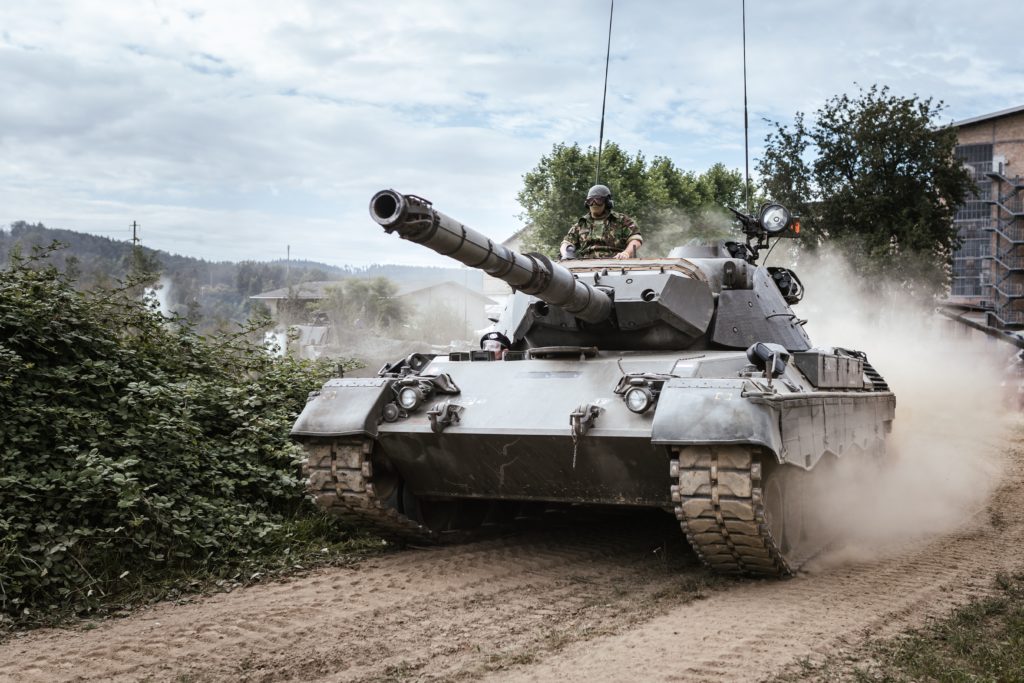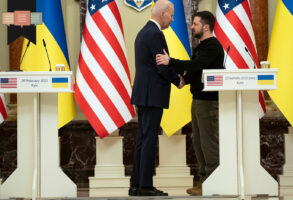
Published March 5, 2022
By now, anyone paying the slightest attention to Vladimir Putin’s assault on Ukraine, its people, and its sovereign independence knows that the Russian autocrat, deceived by his own distorted conviction that Ukraine is not a real country, anticipated a quick walk-over in the war he launched without provocation on February 24: an invasion to which Ukraine would succumb in forty-eight hours.
Striking confirmation of that delusion – and the historical falsehoods that led to it – came recently from state-owned Russian news agency RIA-Novosti, which posted a victory editorial on February 26, two days after the invasion. The post has now been deleted, but its content, as reported by the BBC, speaks volumes about Putin’s regime and its view of Ukraine. On the reasonable assumption that the editorial also reflects the pre-invasion Kremlin assumption that the Ukrainians would fold like a cheap suitcase, that embarrassingly premature declaration of victory also explains the rage, and perhaps even mania, now driving the increasingly barbaric Russian war against Ukrainian civilians and civic infrastructure, which has now gone so far as to include an attack on a nuclear power plant that risked creating six Chernobyls.
The headline on RIA-Novosti’s editorial, “The arrival of Russia and a new world,” nicely captured in eight words Putin’s geopolitical megalomania and its roots in his imperial conception of Russian national identity. It celebrated the fact that “Ukraine has returned to Russia,” thus restoring Russia’s “historical fullness, gathering the Russian world [Ruskiyy mir] and the Russian people together.” In this “virtual civil war,” Russia was restoring the unity of “Russians, Belarussians, and Little Russians” (i.e., Ukrainians), which had dissolved with the “disaster” of the Soviet Union’s collapse in 1991. Putin is, of course, praised in RAI-Novosti’s editorial as the father and architect of this historical, ethnic, and, one assumes, spiritual rectification of the right order of things.
According to the state news agency, then, the war on Ukraine – the “special military operation” – was a historical imperative. There was a wound in the fabric of reality that Putin decided to heal on behalf of future generations. And in that healing Russia would be returned to its “historical space and its place in the world.” Moreover, thanks to Putin’s vision and courage, the “Anglo-Saxons” have been cut down to size and “Western global domination can be considered completely and finally over.”
The reductio ad Hitlerum is generally to be avoided in analyzing current events. But those who have read Cambridge historian Brendan Simms’ highly-praised 2019 book Hitler: A Global Biography will find ominous parallels between the mid-twentieth century and today. According to Simms’ analysis, Hitler’s real bogeymen were not the Soviet Union and communism (which he thought he could eliminate from the world chessboard rather easily), but the “Anglo-Saxons” (the United Kingdom and the United States) and the capitalist system they embodied. Add Hitler’s fixation on German ethnic reunification and Lebensraum [living space] to Simms’ account, and, by the testimony of that rather prematurely posted RIA-Novosti editorial, you get Vladimir Putin in the chilling historical role of Schicklgruber’s Ghost, returned from the infernal regions.
Perhaps more to the immediate point in this war, the RIA-Novosti editorial and Putin’s actions make it pluperfectly clear that the Russian autocrat’s world historical project will not be finished when, as he imagines, he finishes off an independent Ukraine. The entire post-World War II international order, which for all its faults has maintained Great Power peace while lifting billions out of colonial subjugation and abject poverty, is his target. Putin’s World – presumably in league with Xi Jinping’s World – is not a world that anyone with a sense of the human decencies should want to live in. That is why the Putin Project must be stopped, and now rather than later.
Nonsense about the Monroe Doctrine
Among the more bizarre claims being asserted during the first ten days of this war – by Catholic integralists, analysts who imagine themselves foreign policy realists, comedian Bill Maher, followers of Donald Trump who now seems more “America First” than their paladin, and a handful of academics seekingto impose their theories on the Procrustean bed of reality – is that Vladimir Putin’s assertion of a Russian sphere of influence is no different than the American Monroe Doctrine, which warned European powers to stay out of the western hemisphere. This is complete nonsense.
In the happy days when the president’s constitutionally mandated “state of the union” report to Congress was an act of statesmanship rather than a media circus, President James Monroe’s message to Congress of December 2, 1823, included the declaration that the United States would regard future European colonial efforts in the western hemisphere as acts hostile to the United States. Latin American colonies had been busily liberating themselves from Spanish colonial rule for some time. Thus Monroe and his secretary of state, John Quincy Adams, thought it important to state the United States’ conviction that the age of European colonization in the New World was over and ought not be reopened.
The chief objective of the Monroe Doctrine, then, was to prevent the recrudescence of colonialism. Which is, of course, the precise opposite of what Putin’s ongoing efforts to recreate a Russian sphere-of-influence – first in the old Soviet Union and then in Central Europe – are about. Putin seeks to reestablish colonial hegemony, not prevent it. This is so obvious that it shouldn’t have to be asserted, especially to those “national conservatives” dedicated to the revival of a nation-state concept they deem weakened by economic globalization and foreign policy internationalism. But as Mr. Orwell famously said when many of his countrymen were deluding themselves in the 1930s about the dangers of totalitarian regimes, “We have now sunk to a depth at which restatement of the obvious is the first duty” of the intelligent and the morally serious.
So, please: no more claptrap about Vladimir Putin playing variations on a theme by James Monroe and John Quincy Adams.
Crackpot Realism vs. Prudence Rightly Understood
Closely allied to the distortions of the Monroe Doctrine being deployed to underwrite a laissez-faire approach to Putin’s war are the claims of some self-styled foreign policy “realists”. The butchery underway over the past week in Ukraine has muted some of these assertions, with realists now bemoaning the “tragic” loss of life and urging that, as NATO is not going to go to war with Russia (by, for example, NATO aircraft enforcing a No-Fly Zone over Ukraine, which would bring NATO forces into combat with Russian forces), the “realistic” thing to do is to urge Ukraine to make the best deal it can. Such a deal – perhaps a partition of the country and a reabsorption of eastern Ukraine, southern Ukraine, and the area around Kyiv into Russia – would, these foreign policy realists suggest, likely satisfy Putin, whom they deem a “rational actor.”
Putin may indeed be a “rational actor” within his own KGB-formed frame of reference, amplified (at least rhetorically) by his historically fallacious ideas about the millennium-long effects of the baptism of the eastern Slavs in 988. But foreign policy realists who imagine that Putin would be satisfied with a rump Ukraine, centered on Lviv and perhaps neutralized and demilitarized, are about as realistic as those who imagined that Hitler would be “satisfied:” first with reoccupying the Rhineland and stationing German troops there; then with the Austrian Anschluss; then with the Czech Sudetenland; then with the creation of the “Protectorate of Bohemia and Moravia” and the dissolution of Czechoslovakia; then with a return of Danzig (Polish Gdańsk) to Germany. Putin’s ambitions do not fit neatly – indeed, they do not fit at all – within Western political science models of “rational actors.”
There is also a disturbing moral hollowness in this kind of foreign policy realism. George W. Bush may have been overreaching when he declared, in his January 2005 inaugural address, that America’s global ambition was to end tyranny on earth. (Although elements of that admirable vision of a world without tyranny echoed Pope St. John Paul II’s 1995 address to the U.N. General Assembly, with its celebration of the “extraordinary global acceleration of that quest for freedom which is one of the great dynamics of human history.”) But is overreach in service of noble ends more to be deplored, strategically and morally, than a crackpot realism which abandons any notion that international politics, like all politics, is a sphere of moral judgment and moral agency?
Yes, prudence is the greatest of political virtues. Prudence, however, means fitting appropriate means to good ends. Prudence doesn’t mean wringing one’s hands over situations prematurely deemed insoluble and then walking away, sighing. Prudence doesn’t mean bemoaning the “tragedy” of Putin’s War. Prudence means calling Putin’s War for what it is – wickedness on a massive scale – and then figuring out ways to blunt his barbarism that do not make matters worse.
So if NATO cannot establish a No-Fly Zone over Ukraine (for strategic reasons, and because it may not have the military capacity to do so), NATO countries can immediately transfer every former Soviet-era aircraft in the NATO inventory to Ukraine: planes Ukrainian pilots need no training to fly. NATO can immediately ramp up the transfer of unmanned drones, capable of destroying Soviet armored columns, to Ukraine. The West as a whole can further strengthen economic sanctions, including a complete boycott of Russian oil exports.
The West can also intensify its resistance to Putin’s War in the global information space. Putin and his thugocracy have tried to hermetically seal the Russian people off from the truth about what Russia is doing in Ukraine, and what that aggression is costing Russia in military casualties (perhaps as many as 10,000 Russian dead now). Such information autarky is impossible in the world of 21st-century communications, however. So Western nations should be bombarding Russia with the truth about Putin’s war and what it is costing the Russian people: through the Internet, on social media, and in old-fashioned ways like radio broadcasting, which was an effective tool in undermining Soviet power inside the USSR, and throughout central and eastern Europe, during the Cold War.
It would also be helpful if Western leaders would show some of the courage of Ukrainian president Volodymyr Zelensky, by explaining to their constituencies that stopping Putin is imperative; that stopping Putin means sacrifices on the part of the West (including higher energy prices); and that those sacrifices are both morally worthy and strategically imperative.
To leave Ukraine to its fate in the name of a crackpot realism devoid of either moral wisdom or political imagination would be to signal the very end of the West that Vladimir Putin, the Butcher of Kharkiv, seeks. And that is unworthy of free people.
George Weigel is Distinguished Senior Fellow of Washington’s Ethics and Public Policy Center, where he holds the William E. Simon Chair in Catholic Studies. He is the author of over twenty books, including Witness to Hope: The Biography of Pope John Paul II (1999), The End and the Beginning: Pope John Paul II—The Victory of Freedom, the Last Years, the Legacy (2010), and The Irony of Modern Catholic History: How the Church Rediscovered Itself and Challenged the Modern World to Reform. His most recent books are The Next Pope: The Office of Peter and a Church in Mission (2020), and Not Forgotten: Elegies for, and Reminiscences of, a Diverse Cast of Characters, Most of Them Admirable (Ignatius, 2021).
Photo by Kevin Schmid on Unsplash
George Weigel, Distinguished Senior Fellow of the Ethics and Public Policy Center, is a Catholic theologian and one of America’s leading public intellectuals. He holds EPPC’s William E. Simon Chair in Catholic Studies.











